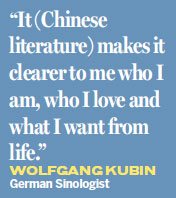Wisdom of sages and poet's inner self
Updated: 2016-01-08 07:57
By Zhou Wa(China Daily Europe)
|
|||||||||||
In 2011 he retired from Bonn University, but instead of settling for a quiet retirement opted to travel to China to continue teaching, writing and translating. Since 2011 he has published six books.
His work schedule is tightly planned, and after getting up at 5:30 am every day he writes, translates and does research until midnight. He cannot stop writing, because if he stops, he "feels ill and cannot sleep well", he says.
"You cannot begin to write until you have inspiration. Actually inspiration comes if you keep writing. That's exactly the thing of 'practice makes perfect'.
"When writing becomes an instinct, it's not you writing articles; it's more like poetry and prose showing themselves through you."
Every week Kubin's prose is published in the Guangzhou newspaper Yangcheng Evening News, and every month articles of his appear in the weekly magazine Southern Weekly, based in the same city.

His Chinese writer friends admire him because not only can he speak Chinese, but it is also better than that of some Chinese natives.
In one piece of Chinese prose, Kubin says: "I like to eat jiangbaorou (brown sauce pork), lazi jiding (spicy chicken slices) and jiaozi (dumplings), also with some erguotou (typical Beijing strong liquor) and peanuts. That almost propels me into heaven."
The poet Wang Xin'an, a friend of Kubin, says: "You can tell there is a kind of vitality in his Chinese. He is sensitive in the language, which is closely associated with his hard work."
Another poet friend, Ouyang Jianghe, calls him a ghost because he always takes friends to visit graveyards. According to Kubin, visiting graveyards calms him.
"You have not lived until you know death. Kubin knows that very well; he is someone who has lived," Ouyang says.
Kubin says he has visited the tombs of many Chinese thinkers and literary giants, such as Li Shangyin and Bai Juyi, poets of the Tang dynasty.
"As I stood in front of the tomb of Master Meng (372-289 BC, also known as Meng Zi, an ancient Chinese thinker, educator and Confucian philosopher), I felt I was communicating with him. I showed my gratefulness to him, because he makes me think about who I am."
Kubin studied theology at the University of Muenster from 1966 until 1968. In 1967 he read a poem by Li Bai and was so struck by it that he decided to study Chinese literature.
Any thoughts he had of traveling to China in those earlier years were stymied by the "cultural revolution" (1966-1976), so instead he went to Japan looking for traces of the Tang dynasty. He eventually traveled to China in 1974 to learn modern Chinese.
Like Li Bai he enjoys a strong drink, to the extent that he says that only liquor with an alcohol content of more than 68 percent can truly impress him.
In his office at Beijing Foreign Studies University is a glass cabinet in which stand bottles of Wuliangye, Maotai and other Chinese spirits. On his desk stands a stainless steel flask.
However, Kubin says he does not drink as he is going about the task of writing or translating; for him the job needs his full concentration.
"Being both a writer and a translator is a serious profession. It's like factory workers and farmers. If farmers don't farm there will be no harvest in autumn."
Writers need a pure love of literature free of utilitarian intent, he says. For Chinese writers looking for level-headedness and serenity he has a suggestion: they can find it in graveyards.
zhouwa@chinadaily.com.cn
Today's Top News
Going mobile
Man with knife shot dead outside Paris police station
Trading halted after shares fall 7% in opening minutes
China voices its 'resolute opposition' to DPRK test
Design exhibition to attract Chinese art works
Germans shaken by mass attacks on women
Concerns grow over Saudi-Iranian rising tensions
Obama tightens gun rules, requires background check
Hot Topics
Lunar probe , China growth forecasts, Emission rules get tougher, China seen through 'colored lens', International board,
Editor's Picks

|

|

|

|

|

|






